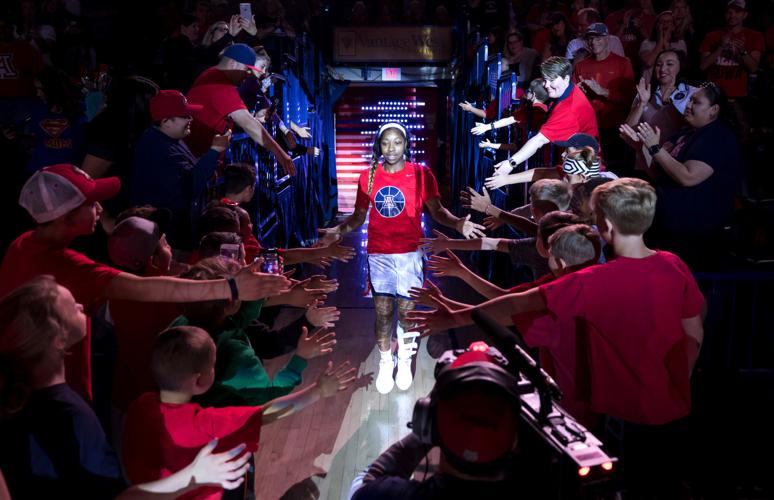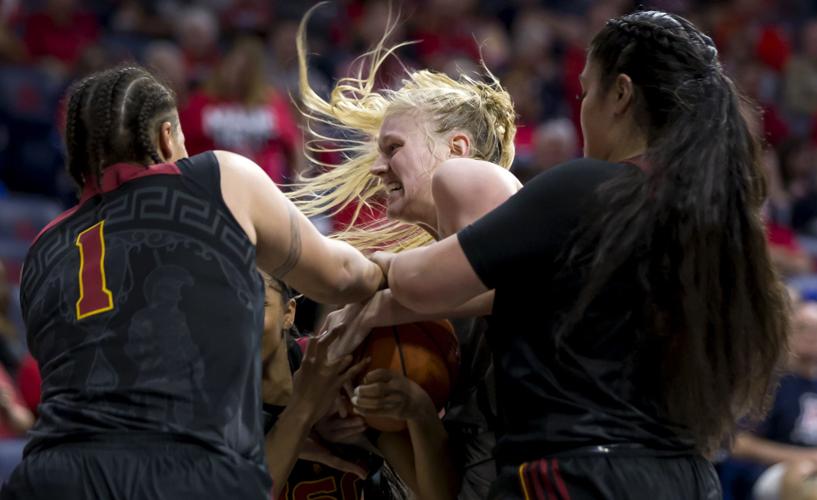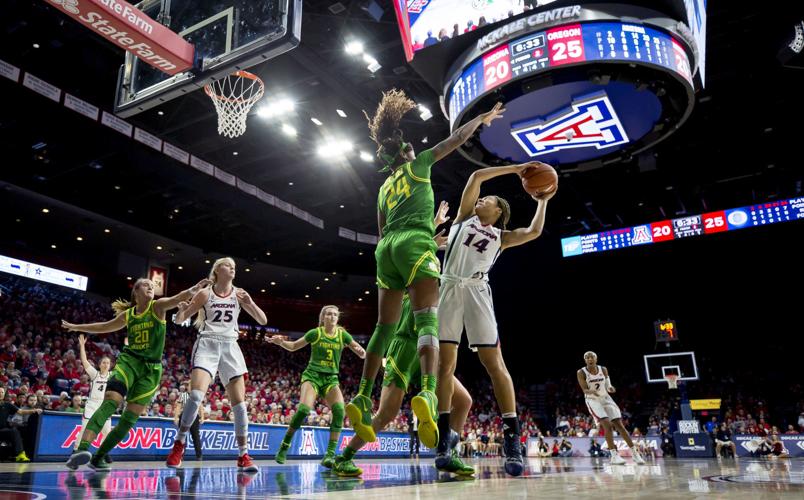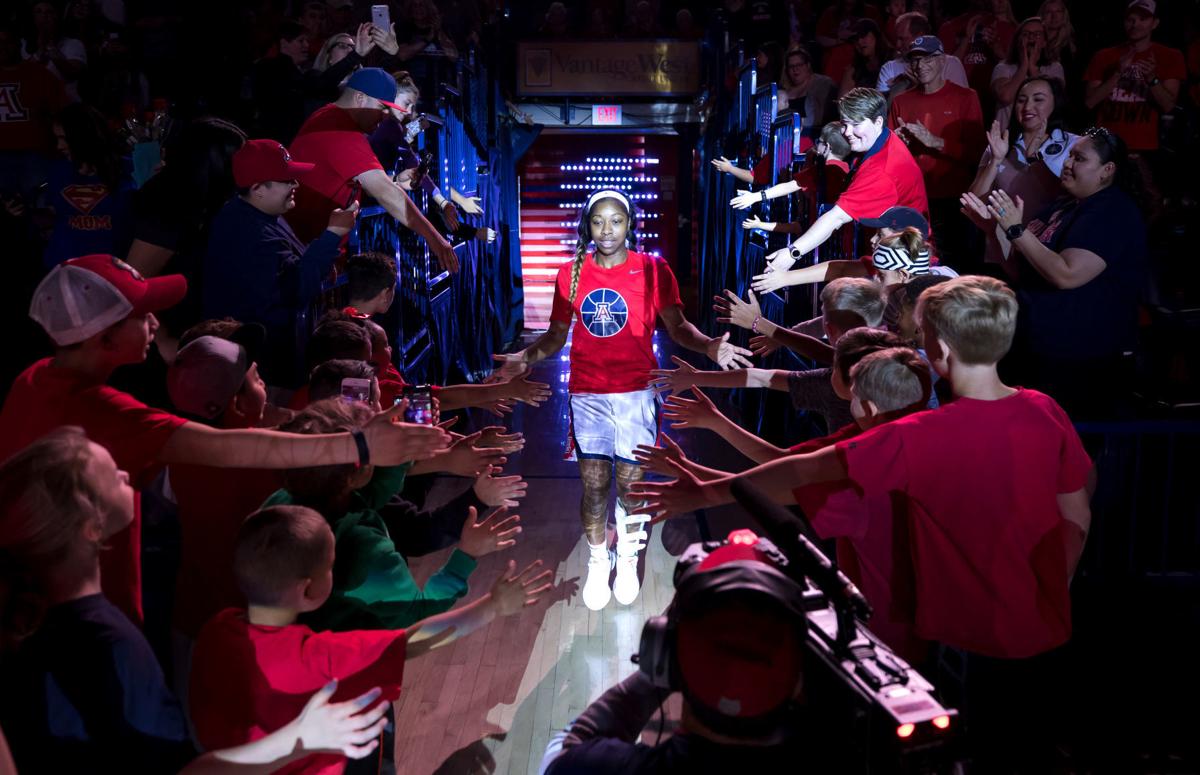It’s safe to say that Arizona is back.
The Wildcats made a statement in 2019-20, advancing to the Pac-12 Tournament semifinals, earning a No. 12 national ranking and an all-but-certain NCAA Tournament berth before all games were canceled because of the coronavirus pandemic.
They were known for their toughness and their defense, delivering on a promise that coach Adia Barnes promised when she took the job four years ago — that the Wildcats wouldn’t be overlooked anymore.
Although, even Barnes admits Arizona is ahead of schedule.
“I think we were better than anyone expected and at some points even surprised ourselves,” she said.
Despite the abrupt and unprecedented ending to their season, these Wildcats will be remembered. Star guard Aari Donald was named a second-team All-American by The Associated Press on Thursday. Barnes has been named a finalist for the Naismith Coach of the Year Award.
“It shows we are no longer rebuilding — we are climbing to the top,” Barnes said. “We are getting better and doing things the right way. All the steps we have taken are the progression of winning so fast. Every time we’ve finished better than we’ve been chosen to finish (in the Pac-12) at the beginning of the season. This year, we were picked sixth and we finished fourth with a chance to finish second. No one would have expected that.”
Barnes got a sense early that this would be a special year. Arizona pulled off a big win over then-No. 22 ranked Texas in Austin. A week later, they were ranked for the first time in 16 years. The Wildcats’ 13-game winning streak – 19, if you count six straight wins that capped the 2018-19 season — was the longest streak in the nation. They beat ASU in Tempe for the first time in 20 years, and beat a top-five-ranked team for the first time in program history.
Here’s what we learned about Arizona during the 2019-20 season:
Explosive McDonald is still dominant
Heading into the season, experts wanted to know if McDonald could repeat her dominant 2018-19 season. She did, although it may have looked different at times.
McDonald opened the season by scoring a program-record 44 points in Arizona’s win over Texas. Her game then developed even more. McDonald finished the season averaging 20.5 points, 5.8 rebounds and 3.6 steals per game — statistics that were in line with her breakout sophomore season.
“Aari has some things you can’t teach — speed and quickness, passion and grit,” Barnes said. “She’s a fighter. A real fierce competitor. You don’t see that. She dives on the floor for the ball. What’s evolved is her offense and her knowledge of the game. She is reading the game better. Her leadership is so much better. And when she gets healthy — she played the last part of the season injured — I can’t wait to see what she does. She plays so hard — fighting for every possession. She’s so unselfish. She doesn’t care about her stats — she wants to win. And she demands so much from herself.”
Defense wins games
Arizona had one of the best defenses in the country this year. Their swarming attack altered shots, narrowed the passing lanes, swatted balls and grabbed steals. Arizona charted deflections, which led to turnovers.
It’s that disruption that resonated. Arizona allowed 55.6 points per game, best in the Pac-12; it held nearly all its opponents in league play under their scoring average and limited teams to 37% shooting. The Wildcats averaged 10.2 steals per game, tops in the league.
McDonald and Thomas led the way, finishing first and second in voting for the All-Pac-12 defensive team. McDonald was named the league’s defensive player of the year.
Arizona’s defensive-minded approach began when Barnes talked to assistant Salvo Coppa about how to manufacture points, especially since the Wildcats weren’t going to be “big” inside.
“Let’s just be more aggressive,” Barnes said. “Especially with Aari, it didn’t make sense not to do so. Everyone bought in. They got more and more confident. With the personnel we have, the numbers were amazing — to have those numbers without freak athletes. We just played solid, organized defense. I think we had a system, they believed and got confident.”
Reese can be a force

Wildcats forward Cate Reese, center, battles for possession of a rebound Sunday. Reese finished with 18 points and 17 rebounds in 34 minutes.
Cate Reese, a sophomore forward, asserted herself as a leader and was a stronger presence in her second season as a starter.
Reese stepped into the spotlight in December, when Dominque McBryde went down with an ankle injury. Reese posted four double-doubles during the six games McBryde was out, and would finish the season with eight of them.
“I think the expectation in her head really makes her step up so when someone like Dominique goes down or Aari gets two fouls, she takes her expectations to another whole level,” Thomas said.
“It just shows on the court. She really just tries to do everything that she can for the team.”
Reese was ill down the stretch but bounced back in Arizona’s Pac-12 quarterfinal win against Cal. Her career-high 30 points helped Arizona avenge a loss from just five days earlier. Reese finished the season averaging 13.6 points and 7.6 rebounds per game, both career highs.
“She had a different sense of hunger, a different level of confidence,” Barnes said. “She finished better, and her game evolved to another level. She fights and plays hard. Against Washington, Washington State, Cal, she dominated inside. She was a lot more consistent — she wasn’t a freshman anymore and knew what to expect this time around.”
Teamwork works

Arizona Wildcats forward Sam Thomas shoots a contested layup during the second quarter of UA’s 71-64 loss to No. 2 Oregon at McKale on Jan. 12.
Each win brought seemingly brought a new player of the game and solid, consistent performances.
“I saw overall growth as a team,” Barnes said. “We were making that extra pass and looking for each other and celebrating each other.”
Thomas took over whenever McDonald was out, knocking down free throws to beat ASU in Tempe and scoring a career-high 31 points when the Wildcats’ star was lost to lower-leg injury.
McBryde sparked comebacks and pull-aways on both offense and defense. She posted a double-double in Arizona’s upset over No. 4 Stanford at McKale Center late in the season.
Penn State transfer Amari Carter had a knack for knowing when her team needed points, and she delivered. More than half of her 45 steals came during Pac-12 play.
Helena Pueyo had a career-high eight assists against Cal in the Pac-12 Tournament and hit 4 of 6 from beyond the arc to highlight a win over Washington.
The future is bright
Typically, a rebuild takes five to six years. Barnes did it in three.
Arizona’s coach has changed the culture, recruited the right players — including one superstar in McDonald — and coached and motivated her team.
Others outside of Tucson are noticing. Barnes was named a finalist for the Naismith Coach of the Year Thursday, along with South Carolina’s Dawn Staley, Oregon’s Kelly Graves and Northwestern’s Joe McKeown.
Pac-12 Commissioner Larry Scott called Arizona’s turnaround “one of the most exciting stories in the Pac-12.”
“I’d say it’s one of the best supported women’s basketball programs in the conference — from a fan perspective,” he said. “I’m excited about the future ... she’s really building something special. … There is no reason they can’t be near or at the top of the league very soon and competing for Final Fours and national championships.”







